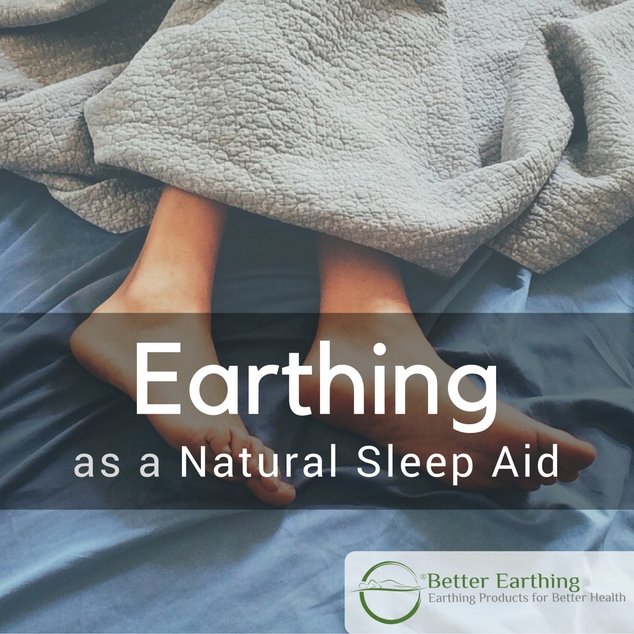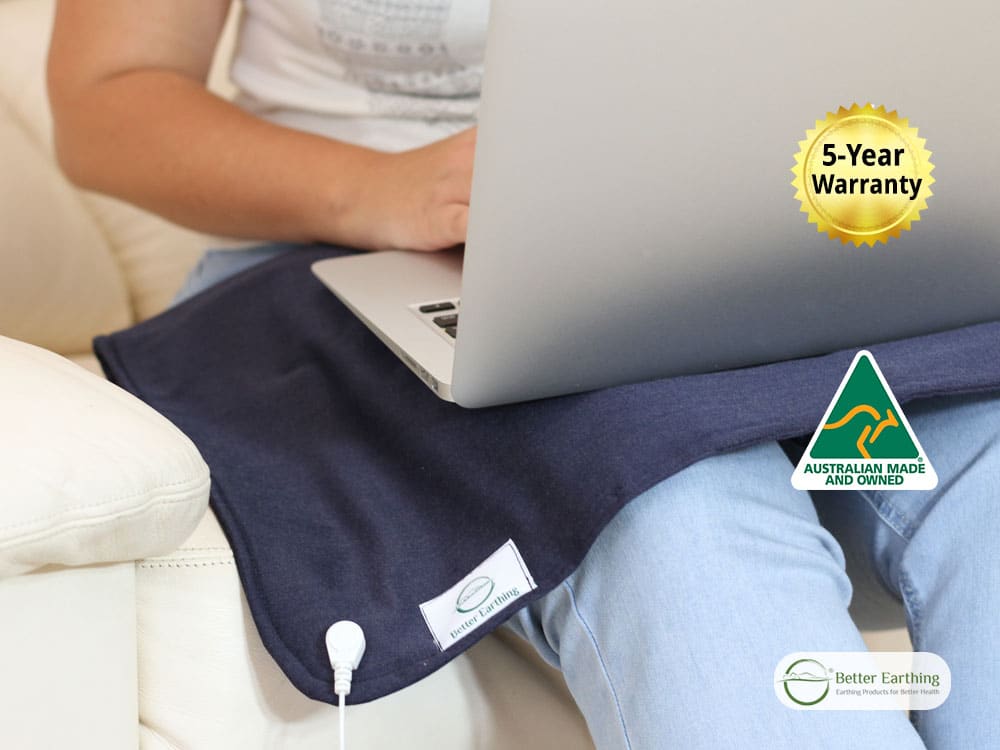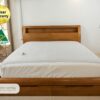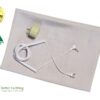Earthing as a Natural Sleep Aid or Remedy

Sleep is one of the most important things our bodies can do. As well as providing physical and mental rest, it allows us to carry out biological processes which are vital to our health and well-being.
We have all experienced the occasional sleepless night and the feelings of tiredness that follow the next day. But when you have long-term sleep problems, this becomes an even more serious issue. Not getting enough sleep can result in daytime drowsiness, reduced concentration, and increased risk of accidents. Lack of sleep has even been linked to weight gain and other serious medical conditions.
Since most sleep aid medications can cause side effects, many people are now seeking natural alternatives. One solution is earthing, the practice of bringing your body into conductive contact with the earth. Earthing has a wide range of health benefits including resetting your biological rhythms and improving both quality and quantity of sleep. You can experience earthing while you sleep with grounding bedding.
What are Natural Sleep Aids or Remedies?
Natural sleep aids are different from medications. They work in harmony with your body’s natural rhythms to restore a normal sleep-wake cycle. Unlike many medications, natural sleep aids are safe and do not cause unpleasant side effects or addiction.
Many different types of natural remedies can help you to get a good night’s sleep. These include herbal preparations, essential oils, relaxation techniques, and good sleep hygiene.
Sleep hygiene is a term used to describe good habits that can help you to fall asleep more easily and stay asleep throughout the night. It includes things like keeping a regular bedtime and making sure that your bedroom is cool and comfortable.
Other lifestyle changes such as making general improvements to your diet and taking regular exercise can also help. Avoid stimulants like caffeine in the evening and do not eat heavy meals late at night. You should avoid doing strenuous exercise just before you go to bed, but some gentle stretches can help to relax your muscles and relieve physical and emotional tension.
Your Sleep-Wake Cycle Explained
Your sleep-wake cycle, also known as your circadian rhythm, is controlled by two hormones; melatonin and cortisol.
In the evening, as it gets dark, your pineal gland (a small gland in your brain) is triggered to release melatonin. This tells your body that it is time to sleep and you begin to feel tired. Melatonin levels rise throughout the evening and finally peak overnight when you should be asleep. They then fall again before morning when it is time to wake up.
Cortisol is secreted by the adrenal glands and has the opposite effect to melatonin. It is responsible for feeling awake and mentally alert. It should peak at around 8 am, when you are waking up, and decrease throughout the day, reaching its lowest levels at around midnight.
When these two hormones are in a balanced state, you should be able to fall asleep easily at night and wake up feeling refreshed in the morning. When something happens to disrupt your natural circadian rhythm, is when sleep problems begin to occur.
Your Sleep Hygiene and its Impact on Your Sleep-Wake Cycle
One simple way that you can positively influence your circadian rhythm and improve your sleep-wake cycle is by practicing good sleep hygiene. It is important to go to bed at around the same time every evening and wake up at the same time every day, even on weekends. This will help your body to get into a routine and should make falling asleep easier.
Because your sleep-wake cycle is so heavily influenced by darkness and light, this is another effective way to improve your bedtime routine. Dim the lights in the evenings, use blackout curtains if necessary, and limit your exposure to electronic displays such as televisions, computers, tablets, and smartphones.
Studies have shown that these devices give off a particular wavelength of light which is likely to suppress your melatonin production and interfere with sleep. So in the evening, ditch the screen and do something relaxing like reading a book or taking a warm bath instead.
Getting enough daylight during the day is also important in regulating your sleep-wake cycle. Make a point of going outside every day, especially if you work indoors and during the winter months when daylight is limited.
Stress and Sleep
Stress and worry are some of the biggest contributors to short-term poor sleep. Most people have experienced lying in bed tossing and turning, unable to switch off their brains. This is especially common before a stressful event such as a job interview or a test.
But there is also a very real, physiological reason why people who are stressed can find sleep more difficult. It all comes down to hormones.
As well as being responsible for waking us up in the mornings and keeping us alert throughout the day, cortisol has many other important functions. One of these is its involvement in the “fight or flight” response to stress.
In potentially dangerous situations, the sympathetic nervous system kicks in. Cortisol levels rise along with adrenaline, allowing us to think clearly and make quick decisions. In the case of a real, physical threat, this can be life-saving. Once the threat has passed, cortisol and adrenaline levels should return to normal, allowing us to relax.
However, if you are stressed due to an ongoing problem such as work or relationship issues, cortisol and adrenaline levels can remain elevated throughout the whole day. Over time, this can lead to sympathetic overdrive and symptoms such as anxiety and sleep disturbance.
This is why many natural sleep aids are geared towards relaxation. This includes herbal remedies such as passionflower and valerian, and essential oils like lavender and bergamot. Another relaxing, natural sleep aid is earthing.
Earthing Explained
Earthing, also known as grounding, is the practice of bringing the body into conductive contact with the earth. The earth’s surface is rich in free electrons, formed by constant lightning strikes across its surface. When transferred to the body, these act as powerful antioxidants and provide a wealth of benefits including resetting your biological rhythms and acting as a natural sleep aid.
One way grounding does this is by normalizing cortisol levels throughout the day and increasing melatonin production at night (Jardim-Perassi BY et al.cited by Oschman). Grounding also affects the central nervous system to promote relaxation and reduce anxiety and stress.
Earthing can be done simply by walking barefoot on a conductive surface such as grass or sand or using an indoor earthing product. Sleeping on an earthing sleep system is one of the best ways to use earthing to improve your sleep naturally.
Research on Earthing for Sleep
This 2004 study looked at the effects of earthing on cortisol profiles and sleep. 12 participants, all suffering from poor sleep, stress, and pain, slept on earthing bedding in their home for eight weeks.
Their cortisol levels were measured over 24 hours, once before the study began and again after six weeks of sleeping grounded to earth. This provided a detailed cortisol profile for each subject before and after earthing. The results showed that following earthing, the majority of the subjects’ cortisol levels had fallen into a more normal pattern, peaking in the morning and reducing as the day went on.
In addition, the subjects all reported improvements in their sleep quality and duration. 11 of the 12 subjects fell asleep more quickly and all subjects woke fewer times during the night. The authors conclude:
“Results indicate that grounding the human body to earth during sleep reduces night-time levels of cortisol and resynchronizes hormone cortisol secretion more in alignment with the natural 24-hour circadian rhythm profile.”
Research on Earthing for Stress
Earthing also has the potential to reduce excessive sympathetic overdrive, balance the autonomic nervous system, and reduce stress.
A 2011 study by Gaetan Chevalier and Dr Stephen Sinatra found that earthing improved heart rate variability (HRV). HRV is an indicator of activity in the autonomic nervous system and can be used to measure levels of stress or relaxation.
In this study, the subjects were earthed using conductive pillows and patches attached to their hands and feet. Seated in a comfortable recliner, the subjects relaxed, and unearthed for 40 minutes. This was followed by 40 minutes of earthing and a further 40 minutes of relaxation alone.
The results showed that HRV improved during earthing, indicating a calming of the autonomic nervous system and increased relaxation. The researchers state:
“In patients who experience anxiety, emotional stress, panic, fear, and/or symptoms of autonomic dystonia, including headaches, cardiac palpitations, and dizziness, grounding could be a very realistic therapy. These patients may see positive effects most likely within 20 to 30 minutes and in almost all cases in 40 minutes.”
How Long Before I Sleep Better?
The length of time needed to improve your sleep can vary from person to person. However, many people begin to experience benefits within just a few days of sleeping grounded. In the above sleep study:
“Many subjects reported that improvements in these conditions — as well as improvements in sleep, pain, and stress — often occurred rapidly within the first few days of grounding rather than gradually over the 8-week test period.”
The testimonials and reviews on earthing for sleep also suggest that earthing has the potential to significantly improve your sleep:
“I purchased the earthing half sheet and I am amazed at how effective it is. Without going into too much detail I have had insomnia for over 10 years and the last 2 it has been constant and debilitating. I have tried almost everything, seen countless doctors, been to neurologists and lots of different natural therapists, and tried countless OTC and prescription sleep medications but nothing has ever worked for me until I slept on your earthing sheet.
“The 1st night I used it I didn’t get any sleep but the 2nd night I got 4 hours in a row, the 3rd 5 hours, and the 4th 6 hours. I have not had that much sleep in a row in over 2 years! It has now been over a week and I’m sleeping every night. I cannot thank you enough, this product has been like a miracle to me and has worked when nothing else would.” Jennefer Johnston NSW
How to Get Started with Earthing
The easiest way to experience earthing, and its many benefits, is to walk barefoot on green grass or wet sand. Within seconds you will feel your nervous system become calmer and your muscles relax.
To optimize the effects of earthing, consider an indoor earthing product such as an earthing sleep system. This will allow you to benefit from earthing every day and enjoy both reduced stress and naturally better sleep.
Earthing Research
Chevalier G, Sinatra S. ‘Emotional stress, heart rate variability, grounding, and improved autonomic tone: clinical applications’ Journal of Alternative and Complementary Medicine 2011;10(3).
Ghaly M, Teplitz D. ‘The biologic effects of grounding the human body during sleep as measured by cortisol levels and subjective reporting of sleep, pain, and stress’ Journal of Alternative and Complementary Medicine 2004;10 (5): 767–776





